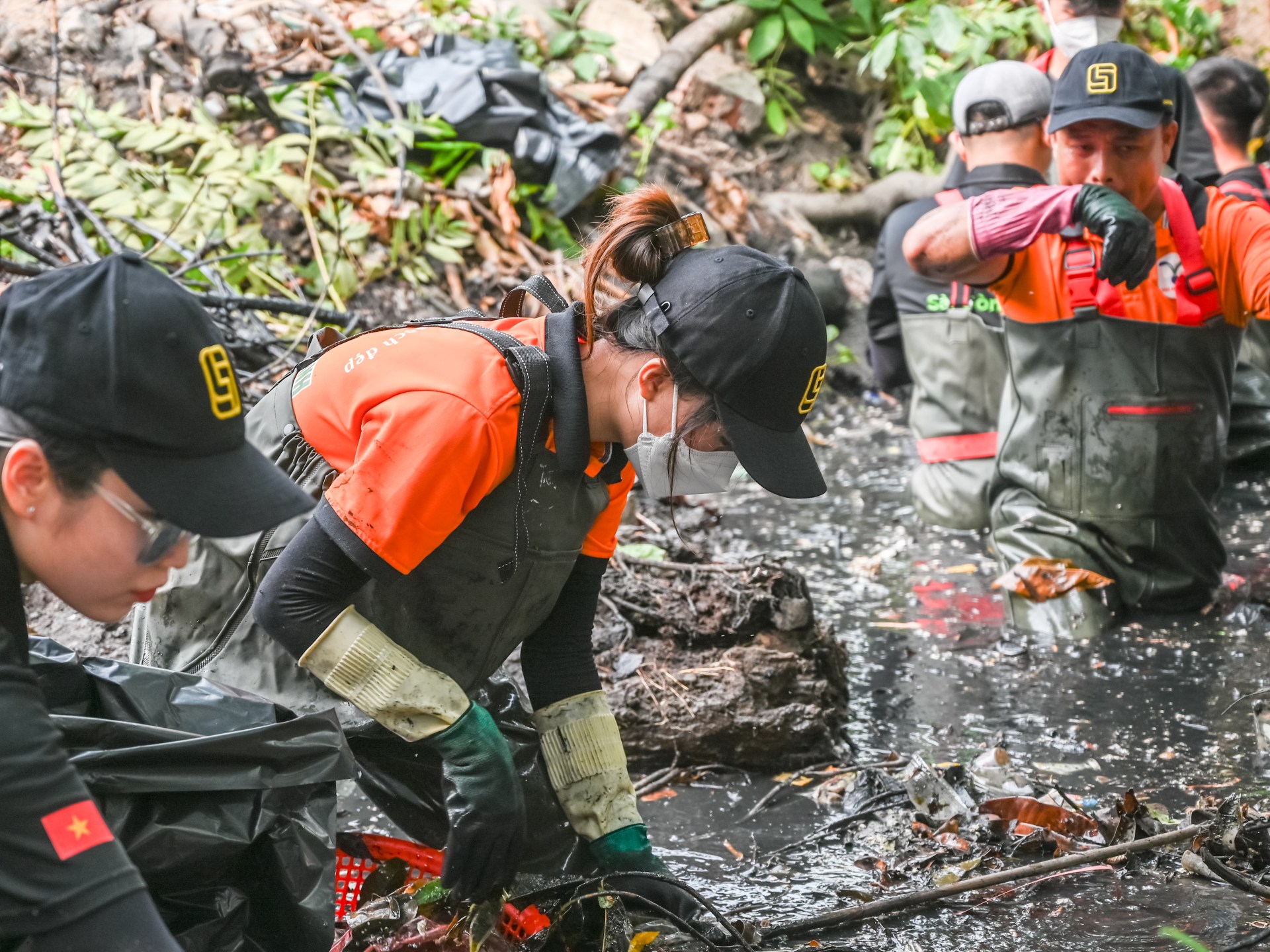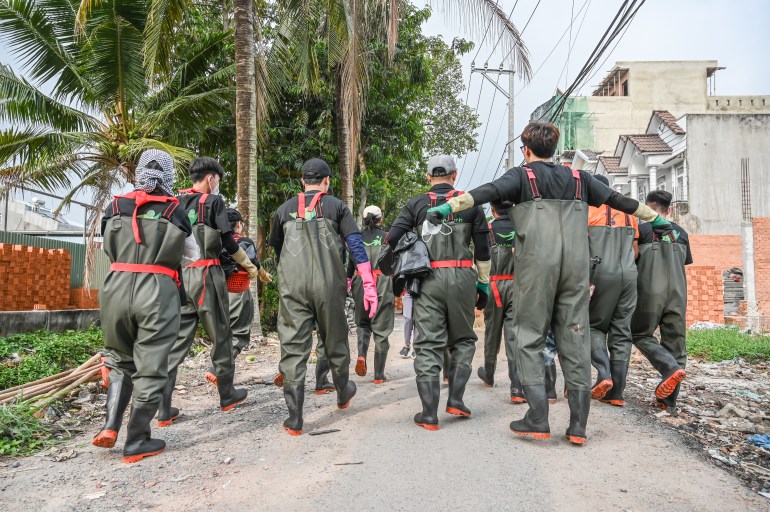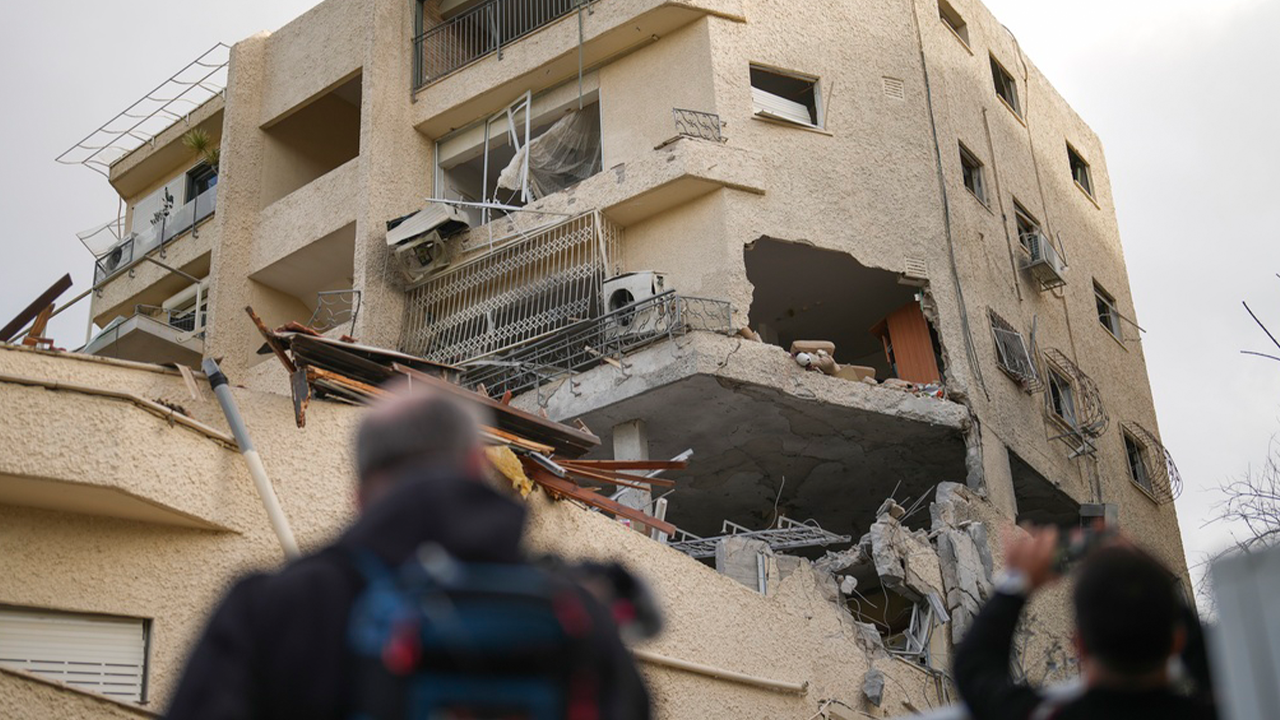World
‘Meaningful work’: Volunteers clean Ho Chi Minh City’s fetid canals by hand

Ho Chi Minh City, Vietnam – It is barely 7am when Nguyen Luong Ngoc and his team of young volunteers meet in the depths of District 12 in Ho Chi Minh City.
A vast pile of takeaway breakfast boxes waits on one side of the narrow road. Behind them lies a stinking canal stuffed with rubbish; its water black and barely moving.
As each volunteer arrives and grabs a box of food, the mood lifts. Everyone is smiling, cracking jokes despite the smell and the mess.
Eventually, a truck pulls up carrying a load of waterproof dungarees and other equipment. The team get into the green rubber suits, spray themselves with mosquito repellent, put on long gloves and wade into the water.
Ngoc and the other volunteers at Sai Gon Xanh – which translates to ‘Green Saigon’ – run regular sessions like these; cleaning up waterways around Vietnam’s biggest city by hand, pulling the rubbish from the water and leaving it in bin bags for waste collectors to remove.
Nhu Van Hoa joined the team a few months ago and is now a regular. Having picked his way through water thick with putrid, rotting food waste, he holds up his glove-covered hands, drenched in black filth.
“I use three layers of gloves,” he said.
The work might be risky, smelly and unpleasant, but there are now hundreds of people like Hoa who join the gatherings in the hope that they can inspire change among the more than 10 million residents of Ho Chi Minh City, once known as Saigon.
The cleanups take place between three and five times a week, and on the weekend, the group tries to rope in as many people as possible.
“On Sundays, that’s when we call everyone – as many volunteers as we can get – roughly about 100 to 200 people, to do the cleanup,” Ngoc told Al Jazeera.
Most of the volunteers are university students, restaurant staff or motorbike taxi drivers, and have irregular schedules, so Sai Gon Xanh creates a flexible timetable to give them all the opportunity to participate.
Another volunteer, Hoang Thi Thanh Nga, is just 20 years old. She joined the Sai Gon Xanh team because she wanted to contribute to her city.
She says the water is not cold at this time of the year, and volunteers get used to the smell.
The length of time spent cleaning up depends on the location. “In some places, one session is enough which is around three to four hours,” said Ngoc. “Sometimes it’s a whole day or two, three days, it depends on the site.”
No official recycling system
Ho Chi Minh City produces about 9,500 tonnes of domestic rubbish every day and there is little in the way of formal recycling.
The city’s two main landfills are rapidly reaching capacity and authorities are looking to incineration and the conversion of waste into energy as potential ways forward.
“Despite being the commercial capital of the country, there is no official urban waste recycling system in Ho Chi Minh City,” Bijeesh Kozhikkodan Veettil, an expert in remote sensing, GIS and environmental research at the city’s Van Lang University, told Al Jazeera. “Instead, the local government depends on small companies for waste management in the city.”
The Sai Gon Xanh team usually chooses a ward to clean up and then contacts the local government representatives to seek their permission. They also ask for advice on which locations are most in need of their help.

The cleanups typically take place in the mornings when the sun is not too strong and the air is still comparatively cool. The team gathers, and the suits – provided by Sai Gon Xanh – are distributed.
But while the suits look impressive, they go only a small way to protecting the volunteers from the dangers of their work.
“The rubber suit is what we bought at the small factory store,” said Ngoc. “They are normal rubber … and just [make the work] a little bit less dangerous.”
The volunteers face serious health risks from the rank waterways.
“If you’re negligent, you could die,” said Ngoc. “It causes a lot of skin problems … intestine problems, lung problems, so it does affect a lot with regards to health.”
There is also the risk of stepping on a needle while working in the rivers, he said. The team all take regular anti-HIV medication to lower the risk of infection.
“This helps prevent roughly up to 70 – 80 percent [of HIV infections],” said Ngoc, adding that the volunteers also stay up to date with vaccinations for as many other diseases as possible.
A mindset shift
But for the Sai Gon Xanh volunteers, the risk is worth it.
“Every time we have finished cleaning up the canals, I feel very happy,” Hoa told Al Jazeera.

According to Hoa, many people in Ho Chi Minh City have little awareness of the consequences of littering.
A lot of this comes down to a culture of convenience, according to Ngoc.
“[There are] a lot of hawkers, street food vendors, and they use a lot of these one-time-use products, like plastic bags [and] utensils,” he said. “There are not a lot of garbage bins around the city, so that’s why there’s a habit of people just throwing it as is convenient for them.”
This is particularly true of the migrants who come to the city from other parts of the country and do not stay long enough to see the effect of persistent littering, he added.
The Sai Gon Xanh team says the government has intervened, with heavy fines for offenders, billboards and other means to spread awareness.
The government also actively cleans up sites around the city, Ngoc said, but because they use machines and work quickly, people do not realise how significant the litter problem is. People also simply assume that the government will clean up their mess, he added.

“That creates a habit of just throwing it, and someone will pick it up,” said Ngoc. “We record content about our work and put it online so that when … we do it by hand and people see [our] images and footage, they get touched [and] maybe, on some unconscious level, it helps them refrain from throwing [rubbish].”
In the past four to five months, Sai Gon Xanh has cleaned up roughly one tonne of rubbish across more than 100 canals around the city.
“It’s very meaningful work,” said Nga. “When we do it – yes, of course, it’s not nice – but then after, when we see the canals are cleaner, I feel very happy.”

World
Trump's FDA Pick Is Surgeon and Writer Martin Makary
World
Israel moves towards ceasefire deal with Hezbollah: reports

Israel is reportedly moving towards a ceasefire agreement with Hezbollah in Lebanon after nearly a year of fighting escalated into an all-out war in September.
Israeli media outlets including YNET and Haaretz have reported that Israel has tentatively agreed to a U.S.-backed proposal for a ceasefire. No final deal has been reached, according to the reports.
Journalists take pictures of a building hit direct by a rocket fired from Lebanon in Haifa, Israel, Sunday Nov. 24, 2024. (AP Photo/Francisco Seco)
Lebanon and the militia group Hezbollah reportedly agreed to the deal last week but both sides need to give the final okay before it can materialize.
The reported ceasefire deal comes after Hezbollah launched one of its largest rocket attacks on Israel in exchange for Israeli forces striking Hezbollah command centers in Beirut.
This is a developing story. Check back for updates.
World
Yamandu Orsi wins Uruguay’s run-off presidential election

Yamandu Orsi, the candidate for the left-wing Broad Front coalition, is projected to emerge victorious in Uruguay’s run-off election for the presidency.
He bested Alvaro Delgado of the ruling National Party to win the tightly fought race, though public opinion polls showed the two candidates in a dead heat in the lead-up to Sunday’s vote.
Orsi’s supporters took to the streets in the capital of Montevideo, as the official results started to show the former mayor and history teacher surging ahead.
Many waved the party banner: a red, blue and white striped flag with the initials FA for “Frente Amplio”, which translates to “Broad Front”.
“Joy will return for the majority,” the coalition posted on social media as Orsi approached victory. “Cheers, people of Uruguay.”
Orsi’s win restores the Broad Front to power in the small South American country, sandwiched on the Atlantic coast between Brazil and Argentina.
For 15 years, from 2005 to 2020, the Broad Front had held Uruguay’s executive office, with the presidencies of Jose Mujica and Tabare Vazquez, the latter of whom won two non-consecutive, five-year terms.
But that winning streak came to an end in the 2019 election, with the victory of current President Luis Lacalle Pou, who led a coalition of right-leaning parties.
Under Uruguay law, however, a president cannot run for consecutive terms. Lacalle Pou was therefore not a candidate in the 2024 race.
Running in his stead was Delgado, a former veterinarian and Congress member who served as a political appointee in Lacalle Pou’s government from 2020 to 2023.
Even before the official results were announced on Sunday, Delgado had conceded, acknowledging Orsi’s victory was imminent.
“Today, the Uruguayans have defined who will hold the presidency of the republic. And I want to send here, with all these actors of the coalition, a big hug and a greeting to Yamandu Orsi,” Delgado said in a speech as he clutched a large Uruguayan flag in his hand.
He called on his supporters to “respect the sovereign decisions” of the electorate, while striking a note of defiance.
“It’s one thing to lose an election, and another to be defeated. We are not defeated,” he said, pledging that his right-wing coalition was “here to stay”.
The outgoing president, Lacalle Pou, also reached out to Orsi to acknowledge the Broad Front’s victory.
“I called [Yamandu Orsi] to congratulate him as president-elect of our country and to put myself at his service and begin the transition as soon as I deem it pertinent,” Lacalle Pou wrote on social media.

Orsi had been considered the frontrunner in the lead-up to the first round of the elections.
Originally from Canelones, a coastal regional in the south of Uruguay, Orsi began his career locally as a history teacher, activist and secretary-general of the department’s government. In 2015, he successfully ran to be mayor of Canelones and won re-election in 2020.
In the 2024 presidential race, Orsi – like virtually all the candidates on the campaign trail – pledged to bolster Uruguay’s economy. He called for salary increases, particularly for low-wage workers, to grow their “purchasing power”.
He also called for greater early childhood education and employment programmes for young adults. According to a United Nations report earlier this year, nearly 25 percent of Uruguay’s children live in poverty.
But the economy was not the only issue at the forefront of voters’ minds. In a June survey from the communications firm Nomade, the largest share of respondents – 29 percent – identified “insecurity” as Uruguay’s “principal problem”.
That dwarfed the second-highest ranked topic: “Unemployment” was only picked by 15 percent of respondents.
As part of his platform, Orsi pledged to increase the police force and strengthen Uruguay’s borders, including through the installation of more security cameras.
As he campaigned, Orsi enjoyed the support of former President Mujica, a former rebel fighter who survived torture under Uruguay’s military dictatorship in the 1970s and ’80s.
Mujica remains a popular figure on Uruguay’s left, best known for his humble living arrangements that once earned him the moniker of the “world’s poorest president”.

In the first round of voting, on October 27, Orsi came out on top, with 44 percent of the vote to Delgado’s 27 percent. But his total was far short of the 50 percent he needed to win the election outright, thereby triggering a run-off.
The race got tighter from there forward. Only two candidates progressed to the run-off – Delgado and Orsi – and Delgado picked up support from voters who had backed former Colorado Party candidate Andres Ojeda, a fellow conservative who was knocked out in the first round.
Nevertheless, Orsi quickly pulled ahead after the polls closed for the run-off election on Sunday.
“The horizon is brightening,” Orsi said in his victory speech. “The country of freedom, equality and also fraternity triumphs once again.”
-

 Business1 week ago
Business1 week agoColumn: Molly White's message for journalists going freelance — be ready for the pitfalls
-

 Science5 days ago
Science5 days agoTrump nominates Dr. Oz to head Medicare and Medicaid and help take on 'illness industrial complex'
-

 Politics1 week ago
Politics1 week agoTrump taps FCC member Brendan Carr to lead agency: 'Warrior for Free Speech'
-
/cdn.vox-cdn.com/uploads/chorus_asset/file/25739950/247386_Elon_Musk_Open_AI_CVirginia.jpg)
/cdn.vox-cdn.com/uploads/chorus_asset/file/25739950/247386_Elon_Musk_Open_AI_CVirginia.jpg) Technology7 days ago
Technology7 days agoInside Elon Musk’s messy breakup with OpenAI
-

 Lifestyle1 week ago
Lifestyle1 week agoSome in the U.S. farm industry are alarmed by Trump's embrace of RFK Jr. and tariffs
-

 World1 week ago
World1 week agoProtesters in Slovakia rally against Robert Fico’s populist government
-

 News7 days ago
News7 days agoThey disagree about a lot, but these singers figure out how to stay in harmony
-

 News1 week ago
News1 week agoGaetz-gate: Navigating the President-elect's most baffling Cabinet pick
















